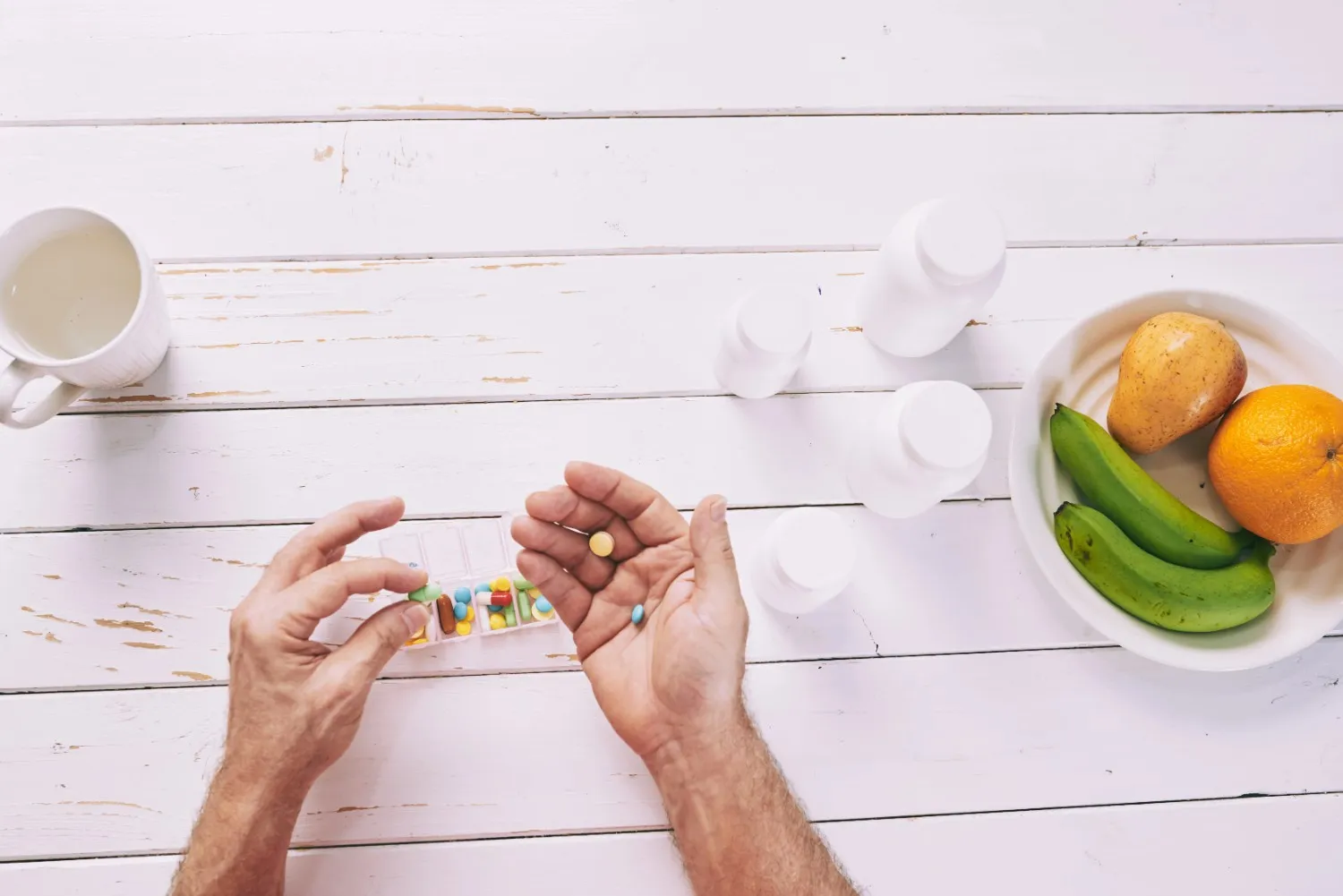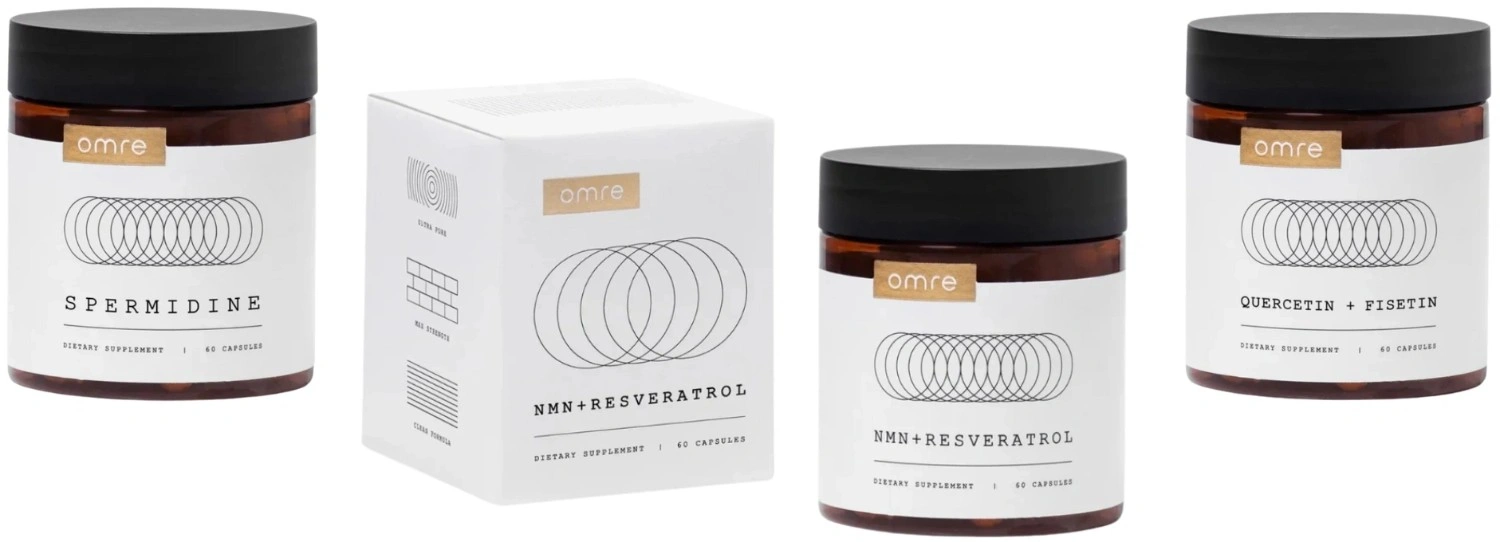Table of Contents
Here are some of the best longevity and anti-aging supplements:
-
NMN
-
Resveratrol
-
Spermidine
-
Fisetin
-
Quercetin
-
CoQ10
-
Creatine
-
Taurine
-
Berberine
-
Curcumin
-
Magnesium
-
Omega-3 DHA
-
Vitamin D
Living longer is good, but living well while you age is even better. That’s where longevity and anti-aging supplements come in. They support your body on a cellular level, helping with energy, inflammation, brain health, and more.
Below, you’ll find 13 of the best longevity supplements of 2026. Whether you're focused on staying sharp, keeping your energy up, or just feeling better as you get older, this list can help.
Cellular NAD+ booster with ultra‑pure NMN and Resveratrol, at research‑backed doses.*NMN + Resveratrol
What Are Anti-Aging Supplements?
Anti-aging supplements are products that aim to support your body’s natural defenses against aging. They often focus on cellular health, inflammation, DNA repair, and energy production, all of which tend to decline as we age.
While no pill can stop the aging process, certain compounds may help promote healthy aging and improve the quality of life as you age.
Researchers have been studying how supplements like NMN, Resveratrol, and Spermidine affect things like mitochondria, metabolism, and even brain function.
The goal isn’t just to live longer, but to live well. That’s why so many people are looking for top-rated longevity supplements that are backed by real science. Of course, supplements work best when combined with a healthy lifestyle, good sleep, and regular exercise.
Best Longevity and Anti-Aging Supplements
If you’re searching for the best anti aging supplements for longevity, here are the ones researchers and wellness experts are watching closely in 2026.
1. NMN
Nicotinamide Mononucleotide, or NMN, is one of the most talked-about supplements for anti-aging and longevity.
It plays a key role in boosting NAD+ levels in the body, a coenzyme involved in energy production and cellular repair. As we age, NAD+ levels naturally decline, which may contribute to signs of aging.
Animal studies suggest NMN can improve mitochondrial function, enhance DNA repair, and support overall metabolic health (1).
One study published in Cell Metabolism found NMN supplementation helped older mice run farther and maintain better muscle function (2).
While more human research is still needed, early trials have shown that NMN can safely raise NAD+ levels in people. It’s often taken in doses between 250 to 500 mg daily, but it’s best to talk to your doctor before starting any new supplement.
2. Resveratrol
Resveratrol is a polyphenol found in grapes, red wine, and berries. It’s known for its antioxidant effects and potential to activate sirtuins, proteins linked to longevity and cellular protection.
Some animal studies have shown that Resveratrol may support heart health, reduce inflammation, and improve insulin sensitivity (3).
A 2013 review in Ageing Research Reviews suggested that Resveratrol mimics the effects of calorie restriction, which is associated with longer lifespan in many species (4).
Although it’s not a magic pill, Resveratrol is one of the most widely studied anti aging supplements and is often paired with NMN for even better results.
Just keep in mind that many of the positive results are from lab or animal models, so human studies are still ongoing.
3. Spermidine
Spermidine is a naturally occurring compound found in foods like wheat germ, mushrooms, and soy. It has gained attention for its ability to promote autophagy, which is the body’s way of cleaning out damaged cells and making way for new ones.
Research published in Nature Cell Biology showed that autophagy plays a vital role in longevity and cellular renewal (5).
Spermidine supplements are now being studied for their potential to slow down age-related decline and support a longer healthspan.
Many people are adding Spermidine to their daily routine as part of a healthy aging supplement stack, especially since dietary sources often don’t provide enough for therapeutic effects.
4. Fisetin
Fisetin is a plant-based flavonoid found in strawberries, apples, and onions. It’s considered a senolytic, meaning it may help clear away senescent cells, those damaged, inactive cells that build up as we age and cause inflammation.
One promising study in EBioMedicine found that Fisetin reduced the number of senescent cells in aged mice and improved overall health (6). This has sparked interest in Fisetin as a natural anti-aging pill that targets the root causes of age-related decline.
Unlike some other flavonoids, Fisetin seems to cross the blood-brain barrier, making it a potential candidate for protecting brain function over time.
Human studies are still limited, but early signs are encouraging.
5. Quercetin
Quercetin is another flavonoid that works similarly to Fisetin. It’s found in foods like apples, berries, kale, and onions, and is known for its antioxidant and anti-inflammatory properties.
In lab studies, Quercetin has shown the ability to clear out senescent cells and support immune health (7). It’s often combined with Fisetin or other senolytics in longevity protocols.
While it's widely available as a supplement, the body doesn't always absorb it well on its own. Taking it with healthy fats or pairing it with a compound like bromelain can help improve its bioavailability.
6. CoQ10
Coenzyme Q10, or CoQ10, is a powerful antioxidant that your body makes naturally. It plays a major role in energy production, especially inside your cells’ mitochondria—the part that acts like a battery.
As we age, CoQ10 levels tend to drop, which may affect how well our cells function.
Some studies suggest that CoQ10 may support heart health, reduce fatigue, and even help protect the brain (8). It’s often recommended for older adults and those taking statins, which can deplete CoQ10 levels.
You can find it in foods like fatty fish, organ meats, and whole grains, but most people get it through softgel supplements for better absorption. Taking it with a meal that contains fat helps your body absorb it more effectively.
7. Creatine
Creatine is best known for its benefits in fitness and muscle strength, but it’s gaining attention as one of the top rated longevity supplements too. It supports energy production in your muscles and brain, which becomes more important as we age.
Recent studies show creatine may help preserve muscle mass, support memory, and even protect against neurological decline. It's especially helpful for older adults looking to stay active and strong (9).
You naturally get creatine from foods like red meat and fish, but many people choose to supplement with 3 to 5 grams daily. It's considered safe and well-studied.
8. Taurine
Taurine is an amino acid found in many tissues throughout the body, including the brain, heart, and muscles. It helps with everything from cell hydration to antioxidant defense.
In 2023, a large animal study published in Science found that taurine levels decline with age and that restoring those levels improved lifespan and health markers in mice and monkeys (10).
While research in humans is still early, taurine is considered safe and is often included in energy drinks and supplements. Common food sources include meat, seafood, and dairy products.
9. Berberine
Berberine is a plant compound traditionally used in Chinese and Ayurvedic medicine. It's often compared to Metformin because both can help regulate blood sugar and activate AMPK, a pathway involved in energy metabolism and cellular aging.
Early studies suggest berberine might support heart health, reduce inflammation, and help with weight and blood sugar management. Some animal research has even shown lifespan-extending effects (11).
Doses usually range from 500 to 1500 mg per day, often taken in divided doses. It's best to speak with your doctor before starting, especially if you take medication for blood sugar or blood pressure.
10. Curcumin
Curcumin is the active ingredient in turmeric and is known for its strong anti-inflammatory and antioxidant effects. It’s been studied for everything from joint pain to brain health and is often included in anti aging supplements for its ability to fight oxidative stress.
Some research suggests curcumin might help protect the brain from age-related decline and support overall cellular health. It may also support heart health and help reduce chronic inflammation (12).
Curcumin on its own is hard to absorb, but pairing it with black pepper (which contains piperine) can significantly improve absorption. Many supplements include both ingredients for this reason.
11. Magnesium
Magnesium is involved in over 300 bodily processes, from muscle function to sleep and stress regulation. It's one of the most common deficiencies, especially in older adults, and low levels have been linked to issues like fatigue, anxiety, and poor sleep.
In terms of longevity, magnesium supports mitochondrial health, nerve function, and blood pressure control. It also helps the body produce melatonin, the hormone that supports sleep cycles.
You can get magnesium from leafy greens, nuts, seeds, and whole grains. But if you're not getting enough through food, magnesium glycinate or citrate supplements are gentle and well absorbed.
12. Omega-3 DHA
Omega-3 fatty acids, especially DHA, are important for brain and heart health. DHA helps keep cell membranes flexible and supports clear communication between brain cells.
Studies have shown that people with higher DHA levels tend to have better memory and a lower risk of age-related decline (13).
DHA also supports healthy cholesterol levels and reduces inflammation, two things that matter a lot as you get older.
Fatty fish like salmon and sardines are the best sources. If you don’t eat fish often, a high-quality fish oil or algae-based DHA supplement can help fill the gap.
13. Vitamin D
Vitamin D is vital for immune function, bone health, and mood. Low levels are very common, especially in people who live in colder climates or don’t spend much time outdoors.
Research has linked vitamin D deficiency to a range of age-related issues, including weakened immunity, cognitive decline, and bone loss (14). It may also play a role in reducing inflammation and supporting a healthy lifespan.
Your body makes vitamin D through sunlight, but supplements can help if your levels are low. Many experts recommend 800 to 2,000 IU per day, but it’s a good idea to test your levels and talk with your doctor.
How to Choose a High-Quality Longevity Supplement
 Not all supplements are created equal. If you're investing in your health, it’s important to pick products that are safe, effective, and made with care. A good longevity supplement should contain well-researched ingredients, clear dosing, and come from a brand you can trust.
Not all supplements are created equal. If you're investing in your health, it’s important to pick products that are safe, effective, and made with care. A good longevity supplement should contain well-researched ingredients, clear dosing, and come from a brand you can trust.
Here are some things to look for:
Third-party testing: Check if the product has been tested by independent labs for purity and accuracy.
Transparent labeling: Avoid blends that hide ingredient amounts behind “proprietary formulas.”
Clinically studied ingredients: Look for doses that match what has been used in human research.
Reputable brands: Stick to brands that are open about sourcing, manufacturing, and quality control.
- Certifications: Bonus points if it’s certified by NSF, USP, or another trusted organization.
NMN + Resveratrol
Cellular NAD+ booster with ultra‑pure NMN and Resveratrol, at research‑backed doses.*
Are Longevity Supplements Safe?
Most longevity and anti aging supplements are generally well tolerated when used as directed. Many of the ingredients on this list, like NMN, Resveratrol, and CoQ10, have been used in human studies with no serious side effects reported.
That said, supplements can still affect people differently, especially if you have existing health conditions or take medications.
Some compounds may cause mild issues, especially at high doses or when combined with other products.
Potential side effects can include:
Digestive discomfort (bloating, gas, or upset stomach)
Headaches
Skin flushing (with high-dose niacin or some B vitamins)
Interactions with medications like blood thinners or blood pressure drugs
Always talk to your doctor before starting a new supplement, especially if you're taking prescription medications or have any underlying conditions. Just because something is natural doesn't always mean it’s risk-free.
Also, keep in mind that the supplement industry isn’t as strictly regulated as pharmaceuticals. That’s why choosing high-quality products from trusted companies matters.
Can You Combine Longevity Supplements for Better Results?
Yes, many longevity supplements can be combined for complementary effects. For example, NMN and Resveratrol are often taken together because one boosts NAD+ levels while the other activates sirtuins, which rely on NAD+ to work properly.
Stacking supplements is a common practice in longevity research. Spermidine, Fisetin, and Quercetin are also paired in many regimens to target different aging pathways, such as autophagy and cellular cleanup.
That said, more is not always better. It’s important to avoid doubling up on similar ingredients, which can lead to excessive intake or unwanted interactions.
Start slow and build a routine based on your body’s response and your health goals.
If you're not sure where to begin, focus on 2 or 3 supplements for anti aging and longevity that address different areas, like energy, inflammation, and cellular repair.
Then adjust based on how you feel and what your doctor recommends.
Lifestyle Still Comes First
 Supplements can support your efforts, but they work best when paired with a healthy routine. A few smart habits can do more for your lifespan and healthspan than any pill alone.
Supplements can support your efforts, but they work best when paired with a healthy routine. A few smart habits can do more for your lifespan and healthspan than any pill alone.
Eat a balanced, nutrient-rich diet: Focus on whole foods, healthy fats, lean proteins, and fiber-rich plants. This helps fight inflammation and supports gut and brain health.
Get consistent, quality sleep: Aim for 7 to 9 hours. Poor sleep accelerates aging, weakens your immune system, and affects mood and memory.
Move your body regularly: You don’t have to run marathons. A daily walk, light strength training, or stretching routine can make a big difference.
Manage stress in healthy ways: Chronic stress wears down your body over time. Try meditation, journaling, or time outdoors.
Stay socially connected: Relationships and community support are linked to better mental health and even longer life.
These basics may not be flashy, but they’re the foundation for any long-term health strategy.
Conclusion
Throughout this article, we’ve covered 13 of the best longevity supplements that are gaining attention in 2026. From NAD+ boosters like NMN and Resveratrol to senolytics like Fisetin and Quercetin, each one targets aging in a slightly different way.
While supplements aren’t a magic fix, they can be a helpful part of a balanced, wellness-focused lifestyle.
If you're ready to explore high-quality formulas, we offer a curated range of longevity supplements, including NMN + Resveratrol, Quercetin + Fisetin, and Spermidine. 
Check our longevity collection to find the right stack for your goals.
FAQs
What is the most effective anti-aging supplement?
There’s no single supplement that works best for everyone, but many people start with NMN or Resveratrol because of their research around energy, cellular repair, and aging. Others may benefit more from compounds like Spermidine or Fisetin, depending on their needs.
Are there any risks to taking longevity supplements long-term?
Most are well tolerated, especially at standard doses, but long-term effects haven’t been studied fully for all compounds. It’s a good idea to talk to your doctor, especially if you’re combining several supplements or taking medications.
Can supplements really slow down aging?
Supplements can support healthy aging by helping with things like inflammation, oxidative stress, and mitochondrial function. But aging is complex, and no product can stop it entirely. Think of supplements as support, not a cure.
Who should take longevity supplements?
Adults who want to support their healthspan, energy levels, and overall aging process might benefit. That said, it's always smart to assess your diet, lifestyle, and health status first before adding new supplements.
Is NMN better than Resveratrol?
They work in different ways. NMN helps boost NAD+ levels, which is important for energy and cell repair. Resveratrol supports those same pathways by activating sirtuins. Many people choose to take both together for a more complete approach.





